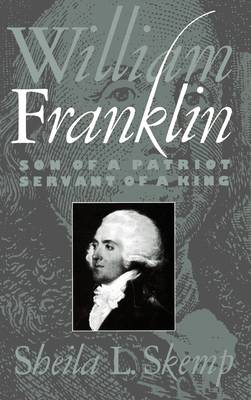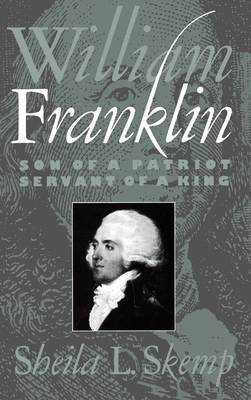
- Retrait gratuit dans votre magasin Club
- 7.000.000 titres dans notre catalogue
- Payer en toute sécurité
- Toujours un magasin près de chez vous
- Retrait gratuit dans votre magasin Club
- 7.000.0000 titres dans notre catalogue
- Payer en toute sécurité
- Toujours un magasin près de chez vous
322,45 €
+ 644 points
Description
When Benjamin Franklin flew his kite in a thunderstorm in his famous experiment, his illegitimate son William was his only companion. Together they traveled through the western wilds of Pennsylvania during the French and Indian War, fought in the colony's fractious political battles. Ben helped his son attain the post of Royal Governor of New Jersey, and William's government hired Ben to represent the colony in London. But when war came, father and son were split: one acclaimed as a patriot hero, the other a loyalist condemned by his countrymen.
In William Franklin, Sheila Skemp tells the story of this fascinating and complex man, a man with a foot in both worlds--he loved both King and country, and saw the interests of both as inextricably intertwined. She follows William's early years as a militia officer in the wars with the French, his life as a law student in England, and his long tenure as Royal Governor of New Jersey. Skemp highlights the close personal and political relationship between father and son, depicting such ironic episodes as William's defense of his father against charges that Ben was the author of the infamous Stamp Act. But as the years passed, Ben, in London, grew increasingly bitter toward the Crown, while William, in America, remained devoted to the King. By the time war came, their loyalties were divided, their relationship destroyed.
Skemp traces William's career through the tumult of revolution and exile. Refusing to follow his fellow royal governors into asylum, he was arrested by the patriots and jailed; his wife soon died, and his property was confiscated. Upon release, William became president of the Board of Associated Loyalists in New York, where--neglected by the British and despised by the revolutionaries--he authorized one of the most notorious atrocities of the war, the hanging of Joshua Huddy. At war's end, Franklin fled into exile in England, hated by his countrymen, and disowned by the father he still venerated, and even loved.
Sweeping and authoritative, William Franklin captures some of the great issues and personalities of the Revolutionary era, and the bitterness of a family split between father and son, patriot and loyalist.
In William Franklin, Sheila Skemp tells the story of this fascinating and complex man, a man with a foot in both worlds--he loved both King and country, and saw the interests of both as inextricably intertwined. She follows William's early years as a militia officer in the wars with the French, his life as a law student in England, and his long tenure as Royal Governor of New Jersey. Skemp highlights the close personal and political relationship between father and son, depicting such ironic episodes as William's defense of his father against charges that Ben was the author of the infamous Stamp Act. But as the years passed, Ben, in London, grew increasingly bitter toward the Crown, while William, in America, remained devoted to the King. By the time war came, their loyalties were divided, their relationship destroyed.
Skemp traces William's career through the tumult of revolution and exile. Refusing to follow his fellow royal governors into asylum, he was arrested by the patriots and jailed; his wife soon died, and his property was confiscated. Upon release, William became president of the Board of Associated Loyalists in New York, where--neglected by the British and despised by the revolutionaries--he authorized one of the most notorious atrocities of the war, the hanging of Joshua Huddy. At war's end, Franklin fled into exile in England, hated by his countrymen, and disowned by the father he still venerated, and even loved.
Sweeping and authoritative, William Franklin captures some of the great issues and personalities of the Revolutionary era, and the bitterness of a family split between father and son, patriot and loyalist.
Spécifications
Parties prenantes
- Auteur(s) :
- Editeur:
Contenu
- Nombre de pages :
- 384
- Langue:
- Anglais
Caractéristiques
- EAN:
- 9780195057454
- Date de parution :
- 09-08-90
- Format:
- Livre relié
- Format numérique:
- Genaaid
- Dimensions :
- 165 mm x 243 mm
- Poids :
- 789 g

Les avis
Nous publions uniquement les avis qui respectent les conditions requises. Consultez nos conditions pour les avis.






